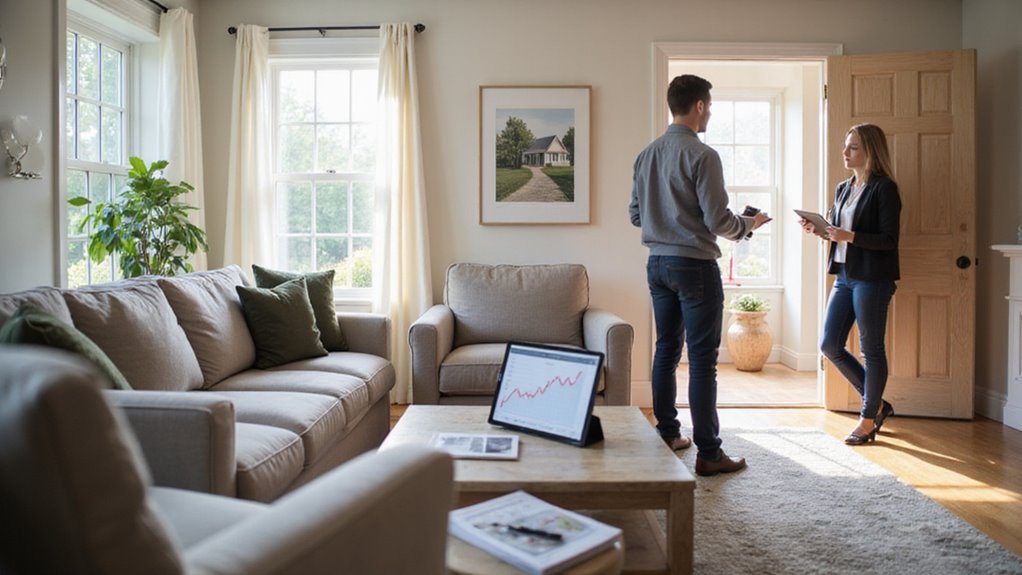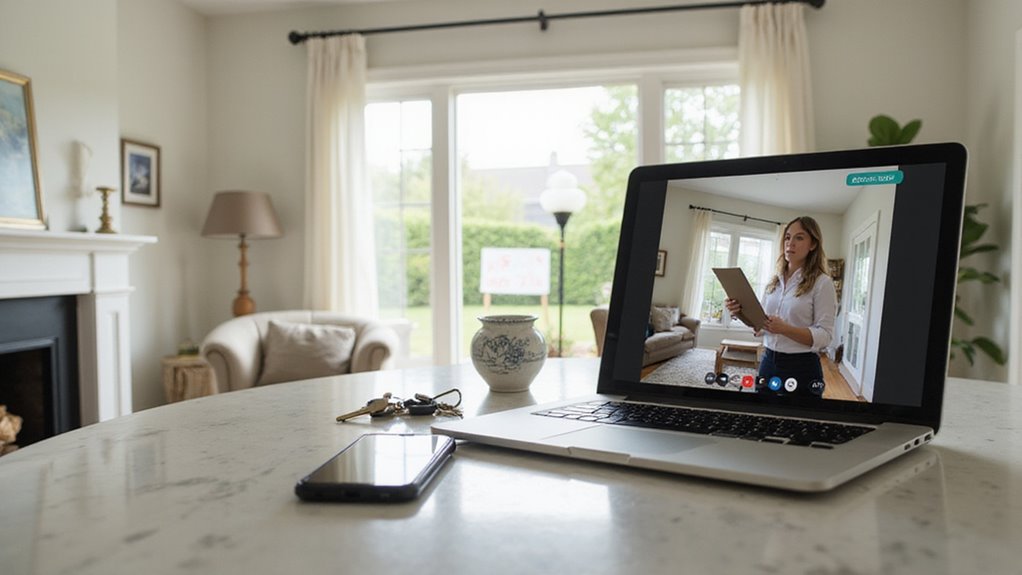Selling your house when moving to another state can feel overwhelming. You must juggle timing, pricing, and moving plans all at once. Many homeowners struggle to get the best price while dealing with the stress of relocating.
It gets even harder if you are already living far away. Long-distance selling makes it tough to handle showings, repairs, and paperwork. Delays or mistakes can cost you money and peace of mind.
The best strategy for selling a house when moving to another state is to use smart pricing, digital marketing, and local help. By following these steps, you can sell quickly and with less stress. You do not have to figure this out alone. This blog will guide you through the process and help you sell your house with confidence and ease.
Key Takeaways
- Hire a real estate agent experienced in interstate moves and remote transactions to streamline the selling process.
- Stage and prepare your home for sale using professional photography and virtual tours to attract remote buyers.
- Price your home competitively based on recent local sales and current market trends to maximize buyer interest.
- Use digital platforms for remote management of showings, negotiations, and communication with your agent.
- Arrange virtual inspections and hire reputable local contractors for repairs to ensure quality and transparency from afar.
Assessing Your Home’s Market Value

Assessing your home’s market value helps you price it correctly for buyers. Accurate pricing attracts interest and helps you get the best offer. If you set the right price, you are more likely to sell your home quickly. A professional appraisal gives you an expert opinion of your home’s value. The appraiser will look at your home’s condition, improvements, and recent sales nearby. Their report helps you understand what buyers might pay. You should also research the market on your own. Look at recent sales of similar homes in your neighborhood.
Check online tools and local real estate reports to spot price trends. When gathering information, don’t forget to review residential property disclosure forms to be aware of potential issues that could affect your home’s value. Combining a professional appraisal with your own research gives you a solid price range. This approach helps you avoid overpricing or undervaluing your home. If you use both methods, you increase your chances of a successful sale.
For even greater accuracy, consider a market analysis that evaluates local sales data, pricing trends, and demand-supply dynamics to help you set a competitive price.
Timing Your Sale for Maximum Profit
The time you choose to sell your home affects your profit. Selling during busy seasons often brings higher offers. Spring and early summer usually have more buyers.
Local trends can change the best time to sell. If possible, research sales in your own neighborhood. Some areas may have different peak months. It’s also wise to conduct a property lien search to ensure there are no unexpected obstacles that could affect your sale.
Improving your home’s appearance helps attract buyers. Simple updates to the yard and staging make a big difference. These changes can increase your home’s value.
If you monitor mortgage rates and the economy, you can adjust your timing. Selling when rates are low may bring more buyers. Careful planning helps you earn more from your sale.
In addition, keeping an eye on the current market value of your house can help you decide whether to sell quickly or wait for prices to rise.
Hiring a Real Estate Agent With Relocation Experience

You need a real estate agent who understands relocation challenges, especially when you’re maneuvering interstate market trends and coordinating showings from afar. Agents with relocation experience use proven strategies, including remote home tours and leveraging robust referral networks, to streamline your sale. According to the National Association of Realtors, sellers who work with relocation specialists consistently report faster transactions and higher satisfaction rates.
It’s also important to discuss any title issues with your agent early in the process, as these can impact both the sale timeline and your negotiations with buyers. If you’re selling an inherited property, partnering with an agent familiar with probate requirements in Florida can help ensure all legal steps are completed before you list the home.
Navigating Interstate Market Trends
Interstate market trends change quickly. A real estate agent with relocation experience helps you make smart choices using up-to-date information. This expert knows both local rules and wider market shifts.
Agents can check price trends in both your current and new locations. They compare how long homes stay listed to set clear timelines. If you want targeted marketing, the agent studies buyer types and demand.
Agents make sure you follow all local rules, which prevents expensive errors. You should pick someone who uses data and acts quickly. If you trust a skilled agent, you can stay ahead of market changes.
Coordinating Remote Home Showings
Coordinating remote home showings is important when selling a house from another state. If you are moving, choose an agent with relocation experience. Such agents handle remote sales more efficiently.
Agents with virtual staging skills attract more online buyers. Staged homes often sell faster and for higher prices. If possible, request virtual tours and digital open houses.
Your agent should schedule showings and collect feedback from buyers. Real-time updates keep you informed at each step. With the right agent and technology, you can sell your home smoothly from a distance.
Leveraging Agent Referral Networks
Agent referral networks can help you sell your house from a distance. These networks connect you with agents who handle remote sales. If you use them, you are more likely to sell quickly and at a good price.
You should ask friends or your new company for agent suggestions. If you get a referral, look for agents with experience in long-distance transactions. An experienced agent can make the process easier for you.
When you speak to agents, request a clear marketing plan. Good plans include virtual tours and advice on home staging and curb appeal. If an agent cannot provide this, you may want to keep searching.
Check how often the agent will update you. Reliable communication is important if you live far away. If you stay informed, you can make better decisions throughout the sale.
Preparing Your Home for Showings

To prepare your home for showings, focus on making a great first impression. Clean the outside, tidy up the yard, and fix any visible damage. Buyers often decide within minutes if they like a property.
If you power wash walkways and trim bushes, the home will look inviting. The National Association of Realtors says most agents recommend improving curb appeal before selling. A close inspection of the building exterior can help you spot and fix issues like roof damage or clogged gutters, which can turn off potential buyers.
Inside, remove clutter and clean all surfaces. Store personal items and valuables away so buyers can picture living there. Kitchens and bathrooms need extra attention, as these rooms influence decisions.
If you fix small issues like leaks or squeaks, buyers will not get distracted. Home staging works best in a clean and neutral space. A well-prepared home often sells faster and for more money. Remember that cost-effective upgrades can enhance your home’s appeal without overspending, ensuring you get the best return when selling.
Staging Your Property to Attract Buyers
Staging helps your property attract more buyers and can lead to a higher selling price. Buyers are more likely to picture themselves living in a staged home. Simple changes can make your place more appealing. When preparing your house, it’s also wise to consider market analysis to help you determine the best way to present and price your property.
Homeowners should arrange furniture to show off space and easy movement. Decorative items like art, mirrors, and plants can add style and warmth. If you use too many items, rooms can look crowded.
Neutral colors often appeal to more people than bold shades. Natural light makes rooms look bigger and more welcoming. If you keep curtains open, your home may feel brighter and friendlier.
Sellers should also avoid spending too much money on the home, since expensive repairs and upgrades are not always necessary to make a property attractive to buyers.
Pricing Your Home Competitively

To sell quickly and maximize your return, you need to analyze recent sales and current listings in your neighborhood. Use this data to set a price that’s both attractive to buyers and competitive with similar homes. A well-priced property stands out and often receives stronger offers. Remember that pricing the home correctly is crucial for a successful “sell my house fast” campaign, as overpricing can discourage serious buyers and delay your sale. Before listing, consider how property ownership structure could impact your selling options, especially if your spouse is in a nursing home.
Analyzing Local Market Trends
Knowing your local real estate market helps you price your home correctly. If you understand what buyers want, you can set a fair price. Local trends can also show you how fast homes will sell.
You should look at recent sales of similar homes nearby. If homes like yours sold quickly, your area may be in demand. Comparable sales give you a clear price range.
Check how many homes are for sale and how long they stay on the market. Fewer homes and faster sales often mean higher prices. If inventory is high, prices may be lower.
Neighborhood changes and community features can affect demand. Good schools, parks, and shops often make homes more valuable. If your area has these, you may be able to ask for a higher price.
Setting an Attractive Price
To set an attractive price, look at recent sales of similar homes in your area. A realistic price helps your home sell faster. If you price too high, your home may stay on the market longer.
Overpricing often leads to future price drops, which can make buyers think you are desperate. If you price your home just below market value, it can attract more interest. Sometimes this even leads to bidding wars.
Strong home staging and good curb appeal can make your home look valuable. These steps help your property stand out in photos and showings. If you want the best results, combine smart pricing with great presentation.
A local real estate agent can help review pricing strategies. You should also stay updated on local market trends. If you follow these tips, your home is more likely to sell quickly and for a good price.
Creating a Strong Online Listing
A strong online listing helps your home stand out to buyers. Most people now start looking for homes on the internet. A well-made listing attracts more buyers and can lead to a faster sale. A strong online listing draws in buyers and can help your home sell faster in today’s internet-driven market.
Professional photos are important because they show your home’s best features clearly. Good pictures make a strong first impression. If you want the best results, consider hiring a skilled photographer. When selling in a hurry, it’s also important to highlight the streamlined process that can make the transition easier for both you and the buyer.
A clear and short description helps buyers understand what makes your home special. You should highlight any upgrades or unique features. If your home has something extra, mention it in the description.
Virtual tours allow buyers to see your home from anywhere. These tours are useful if buyers live far away. If you want to reach more people, include a virtual tour.
Your listing should appear on all major real estate websites and social media. Wider exposure will help more buyers find your home. If you want maximum visibility, share your listing in many places.
To further boost your listing’s appeal, professional staging can make your home look even more inviting to potential buyers.
Managing Showings While Living Out of State

Managing showings from out of state can be challenging. You will need a clear plan to avoid missed chances and delays. If you cannot be there, your real estate agent must handle most tasks.
Your agent should schedule showings and keep your home presentable. Professional staging is a good idea if you want your home to sell faster. Data shows staged homes often sell much quicker.
You can use smart locks or lockboxes to allow safe access for showings. Virtual tours are helpful if buyers cannot visit in person. If you want more buyers, consider both online and in-person open houses.
Your agent should collect feedback after each showing. They can contact buyers or agents for comments. Prompt feedback helps you make improvements if needed.
If you want to strengthen your negotiation position, consider getting multiple appraisals or a second opinion, which can help validate your asking price and provide confidence to potential buyers.
Navigating Offers and Negotiations Remotely
When you get offers remotely, you need to act quickly and confidently. Fast responses help you stay competitive and get better prices. Remote negotiation tools make the process easier for sellers in another state.
Digital offer management platforms let you review, compare, and sign papers safely. If you use these tools, you can handle offers faster and with less stress. Scheduling daily check-ins with your agent helps you stay updated on new offers.
If you use video calls, you can negotiate in real time and solve issues faster. Clear rules for the deal let your agent act without delay. If you prepare in advance, you will be ready to close your sale smoothly.
Understanding Tax Implications of an Interstate Move
When you sell your home during an interstate move, you need to factor in both federal capital gains tax rules and the residency requirements of your new state. IRS data shows that failing to meet primary residence criteria could cost you thousands in unexpected taxes. Review your ownership timeline and confirm your new state’s tax laws so you can minimize your liability.
Capital Gains Tax Rules
Selling your house before moving out of state can trigger capital gains tax. The IRS lets you exclude up to $250,000 in gains if single, or $500,000 if married filing jointly. You must meet certain rules to qualify for this benefit.
You must have owned and lived in the home for at least two of the last five years. If you do not meet this rule, you may owe tax on all gains. Check your residency history before selling.
If you rented out the home, any depreciation you claimed must be reported as taxable income. Keep records of how long the home was a rental. This can affect your taxable gain.
Home improvements can increase your cost basis and lower your taxable gain. Save receipts and records for any major upgrades. These documents help reduce your tax bill.
Good estate planning can help lower taxes for your heirs. If you plan to leave the home to family, talk to a tax advisor. Proper planning can protect your family from extra taxes.
State Residency Requirements
State residency requirements affect how much tax you may owe when selling your home and moving. Each state sets its own rules for residency. These rules decide which state can tax your home’s sale.
If you do not update your residency, you might pay tax in both states. Change your address, driver’s license, and voter registration as soon as you move. Keep documents like closing statements to show where you lived during the sale.
The Tax Foundation warns that not meeting state rules may cause audits or double taxation. You should talk to a tax professional for guidance. This can help you follow the rules and reduce your tax risk.
Coordinating Closing Dates With Your Move
Aligning your closing date with your moving schedule helps reduce stress and costs. Proper planning prevents paying for two homes or needing temporary housing. Careful coordination is key to a smooth move.
You should set your moving timeline early and share it with your real estate agent. If buyers are open, negotiate for a flexible or shared closing date. Sellers can request a rent-back agreement if more time is needed after closing.
All contract deadlines should be tracked closely to prevent delays. If any changes happen, inform all parties quickly. Good communication and planning make relocation much easier.
Handling Repairs and Inspections From Afar
When you’re managing repairs and inspections remotely, hire reputable local professionals with strong online reviews to ensure quality work. Use virtual home inspections—now utilized by over 60% of remote sellers—to monitor progress and address issues in real time. Prioritize clear communication and digital documentation to keep the process efficient and transparent.
Hiring Local Repair Professionals
Hiring local repair professionals helps you manage property repairs even if you live far away. Local experts know the area and can finish jobs quickly. Well-maintained homes can sell faster and at higher prices.
You should always check each contractor’s credentials and reviews. Contractors must have proper licenses, insurance, and good feedback from past clients. If you are uncertain, ask for references.
Request digital estimates with itemized costs and photos of repairs. Remote approval of work keeps you in control. You can avoid misunderstandings by seeing clear photos and written estimates.
Good communication is essential for remote management. If you hire professionals who give regular updates, you will stay informed. Regular progress reports reduce your stress and keep projects on track.
Always set clear expectations in writing. Written agreements should cover deadlines, payment terms, and quality standards. If all terms are documented, you can avoid surprises and build trust with buyers.
Coordinating Virtual Home Inspections
You can manage home inspections from afar by using virtual tools. Arrange video walkthroughs with inspectors to see the property remotely. This method helps you check on the home without being there in person.
Many sellers now use video tools for remote transactions. Scheduling platforms online let you set appointments, get updates, and see reports quickly. If you ask, inspectors can send live streams or video summaries of their findings.
Request clear photos and written records for all repairs. These documents help you track work and check quality. If you use this tech-focused process, you can avoid delays and costly problems.
Securing Temporary Housing if Needed
Sometimes, you may need temporary housing between selling your home and moving into the new one. If your real estate transactions do not match up, plan for a short-term place to stay. Early planning can help you avoid stress and extra costs.
Start your search as soon as possible. Look for short-term leases, corporate housing, or flexible rentals in your new area. Online platforms can help you compare prices and options. Begin your search early and explore short-term or flexible rentals using online platforms to find the best fit for your needs.
Ask landlords if the lease can be extended or ended early if your plans change. Make sure you understand all terms before signing. If you budget ahead, you can avoid surprise expenses like deposits or storage fees. Planning in advance can make your move easier. If you take these steps, your transition will be smoother.
Organizing the Logistics of Moving and Selling Simultaneously
Moving and selling your home at the same time needs careful planning. You must make a clear timeline and talk to everyone involved. If you organize early, you can avoid stress and confusion.
A checklist helps you match moving tasks with your home’s selling steps. You should use tools or apps to track important dates and deadlines. If your moving and selling dates do not match, use a storage unit.
Decluttering makes your home show better and helps you move less. Renting a storage unit lets you store items you do not need right away. If you work with movers and agents, speak with them often to prevent delays.
The table below shows the main steps, actions, and tips for moving and selling at the same time:
| Step | Key Action | Pro Tip |
|---|---|---|
| Declutter | Rent storage unit | Store off-season items |
| Set Timeline | Map key dates | Sync selling & moving tasks |
| Hire Movers | Compare quotes | Book early for best rates |
| Notify Parties | Update contacts | Use checklist for tracking |
| Pack Strategically | Label boxes clearly | Separate essentials |
Conclusion
If you follow the right strategies, selling your house while moving to another state becomes much easier. Careful planning and smart decisions can help you avoid stress and delays. If you hire a relocation-experienced agent and prepare your home for online buyers, your sale will go smoother.
If you need to sell quickly, you should consider selling your house for cash. Cash buyers often handle repairs and close on your timeline. This option can save you time and effort during a busy move.
If you want a simple and fast sale, we can help. At Greg Buys Houses, we buy houses for cash, no matter the condition. Contact us today to learn how we can make your move easier.

